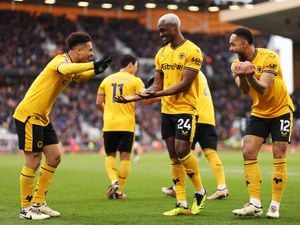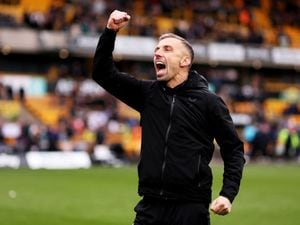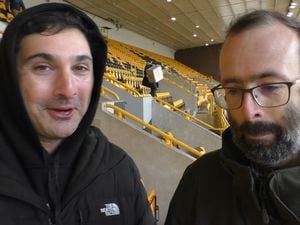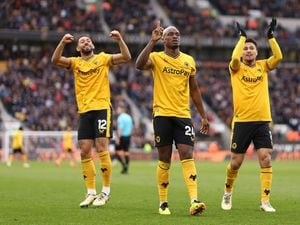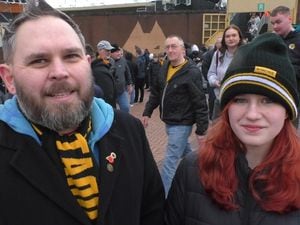Emlyn Hughes' legacy lives on today
It remains Wolves’ most recent major trophy.
The 1980 League Cup, sealed in front of almost 100,000 at Wembley when Andy Gray pounced on a defensive mix-up to tap home in front of hordes of delirious supporters.
And Emlyn Hughes OBE, ‘Crazy Horse’ himself, in his first Wolves season finally lifting the one trophy which had eluded him during 12 years at all-conquering Liverpool.
“Dad knew how much it meant to the fans to win a major trophy,” recalls Emlyn’s daughter Emma.
“So, to pick up the League Cup in his first season was fantastic, especially as it was the only domestic trophy he’d never won during those hugely successful years at Liverpool.
“So, the win was also an especially memorable and enjoyable one for him personally.”
Fast-forward back to the present day, and Wolves and Nottingham Forest are now part of an altogether less salubrious battle to avoid relegation from the Premier League during the second half of the season.
But those concerns will be put on hold when the two lock horns at the City Ground tomorrow night, with a place in the semi-finals up for grabs.
One game from Wembley and a major trophy. It would be the first time Wolves have reached the last four since that memorable afternoon almost 43 years ago. Something to cherish, for sure. A chance to make history.
“Wolves have a good squad and there is an opportunity here,” says John Richards, one of the quartet who played in both the 1980 final and in 1974 against Manchester City, when he struck the winning goal.
“An opportunity not just for the players and the club but for the fans – as much as anything the fans would love a trip to Wembley.
“That’s what people remember more than anything, trips to Wembley and winning a trophy.
“Hopefully Wolves will put their strongest team out and go for out because wouldn’t it be fantastic in 10, 20, 25 years’ time, if supporters can look back and talk about going to Wembley for the League Cup final in 2023.
“How good would that be?”
As good as that March day in 1980, even if the game itself probably wasn’t all that much to write home about.
“It was like a game of chess,” says Mel Eves, a stark contrast to the 1974 final, which he watched from the terraces as a boyhood Wolves fan and recalled as a far more exciting and end-to-end tussle.
But 1980 was a war of attrition perhaps in keeping with the passage to the final, a gruelling sequence of no fewer than nine separate fixtures.
The semi-final was always going to be two legs, but there were replays in early rounds against Burnley and QPR, and a second replay with Grimsby.
Geoff Palmer, part of the quartet with Richards, full back colleague Derek Parkin and midfielder Kenny Hibbitt to play in both finals, actually got Wolves’ first goal in the run in the 1-1 draw with Burnley at Turf Moor.
And then scored again, alongside with Hibbitt, in the 2-0 win in the replay back at Molineux.
“I was top scorer for a while there,” Palmer laughs.
Those goals were needed, but it was Hibbitt who eventually top scored in the competition with four, with Richards typically popping up at crucial times, in that second replay against Grimsby and the semi-final second leg against Swindon.
“It was a slog that run, a real slog,” King John remembers.
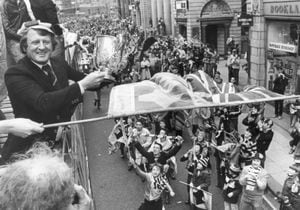
“Game after game, with league games, FA Cup games, we were just on a treadmill playing games and I wouldn’t say it was an enjoyable ride to the final.
“We were actually quite fortunate to get through, a lot of the games were very tight, and none of them were straightforward.
“Even that second replay with Grimsby, when we eventually won 2-0, we could easily have gone out that night.”
Grimsby was the quarter final, and it got pretty lively in the semi-final as well.
Wolves went into the second leg against Swindon in front of over 41,000 at Molineux on the back of a 2-1 deficit from the first.
Richards levelled things up on aggregate and then Eves, with a spectacular overhead kick, nudged Wolves in front.
Not that he actually saw it hit the net.
“I had my back to goal and the ball bounced up, and normally I would have just tried to shield it,” says Eves.
“But instinctively I went for the overhead kick, and it flew right into the far corner, over the keeper.
“I don’t think anyone expected it, especially me, and I didn’t even see it go in because by the time I had fallen on my back the rest of the lads were jumping on top of me.”
There was more drama to come, as Swindon drew level from the penalty spot after Paul Bradshaw ‘cleaned out’ Alan Mayes before Richards pounced to grab the overall winner, which saw him chaired off by ecstatic fans following a full time pitch invasion and scenes of celebration across the city after the game.
And that brings it back to the final for which Wolves prepared very differently to the same situation six years earlier.
“The build-up to the match was completely different and was far more low-key, treated just like another league game,” says Richards.
“Before the 1974 final we went away to London for a few days to prepare, I remember we went to a show on the Thursday night and stayed down for a big banquet after the match.
“But John Barnwell and Richie Barker just wanted to keep the Forest game exactly the same as a league match, even though it was a cup final.
“As senior players at the time, we had a few discussions and even disagreements with John and Richie because we felt it was being underplayed and undervalued.
“They pointed out that they just wanted to treat it as any other game, and we were going to travel down the day before and then come back straight afterwards for a reception at the Mount Hotel.
“Everyone sees things differently from a psychological point of view, and I suppose when you look back, the approach worked, just as it had doing it very differently in ’74.”
While preparation for the game was very much business as usual, preparation for the opponents was far more match specific, and Nottingham Forest specific.
At the time Forest were the reigning European Champions – an achievement they would repeat a couple of months later – and were aiming for their third successive League Cup.
Wolves needed to find a repellent to the Forest fire, and they found it, thanks to a tactical masterstroke devised by Barnwell and Barker.
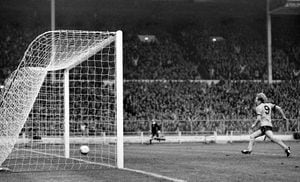
Midfielder Peter Daniel was detailed to take up a position on the right hand side of midfield, with a particular brief on curtailing the attacking impact of left wing talisman John Robertson.
That gave added protection for Palmer at right back, and also allowed him to contribute defensively elsewhere on the pitch.
“We knew how Forest played and what they would try and do and we trained a certain way in the build-up to try and look after John Robertson,” says Palmer.
“It was a masterplan to try and keep an eye on him, playing Peter on the right and pulling him a bit deeper to keep an eye on him.
“That also meant if the ball was on the other side with Trevor Francis it meant I could drop inside and help Emlyn and George (Berry) in the centre when it was needed.
“Forest used to find John with a lot of crossfield passes but the way we played worked perfectly and nullified a lot of his threat.”
There were other threats of course, particularly on the other flank where Eves recalls a very busy 90 minutes playing ahead of Parkin.
“We had to deal with Trevor Francis and Viv Anderson, who could both catch pigeons by the way,” he recalls.
“All I had all match was Derek shouting at me and I think I went to bed that night with his voice constantly in my head – ‘Mel, get back here…Evesey, where are you going’.
“I did a lot of running that day, although I did manage to get forward now and again but mainly kept it simple.
“It wasn’t an outstanding game for me by any means, I didn’t get the ball that much, but you don’t mind when you win and we all knew exactly what we were doing.”
Eves did have one chance, heading across goal in the second half, but when the game’s defining moment came, it was Daniel who provided the teasing 67th minute through ball to produce the mix-up as Forest defender David Needham chested the ball past his onrushing goalkeeper to leave Andy Gray with an open goal.
The then 24-year-old Scottish marksman made no mistake, tapping home for what would prove an historic Wolves goal, and yet had events turned out differently, he wouldn’t have even been able to play.
As has been well documented, Gray was in line to serve a one-game suspension for Wolves’ midweek clash with his former club Aston Villa, but they had an FA Cup quarter final with West Ham the preceding weekend.
Had that game gone to a replay, it would have taken precedence over the league game, and so Wolves wouldn’t have played Villa, and Gray’s suspension would have carried over to the League Cup final.
As it was, it needed a penalty from West Ham’s Ray Stewart two minutes from time to decide the tie, give Wolves the opportunity to play Villa – in which Richards and Eves also sat out as precautions – and give Gray the opportunity to turn out at Wembley.
That also spelled bad news for Norman Bell, who would have stepped in had Gray been injured, and recalls listening to the West Ham/Villa game on the radio.
But ever the team player, Bell shrugged aside his disappointment and was on the scoresheet as Wolves won 3-1, leaving Gray to lead the line in the final.
“Having someone like Andy in the team, and with Emlyn coming in as well, it added to the impetus we had been building as a good team,” Richards recalls.
“I wouldn’t say we were underdogs in the same way we maybe were for the previous final, we were doing well in the league and ended up finishing sixth that season.
“Forest were European champions, and went on to win it again, and were also going for the third successive League Cup which probably marginally made us the underdogs but that wasn’t really something we considered during the build-up.”
‘This could be interesting’ was the line of commentary from the great Brian Moore as Daniel’s through ball headed in the direction of Gray, Needham and Shilton, and it certainly got interesting for the final 23 minutes afterwards.
The game had largely been full of half chances, with Wolves’ defence blocking plenty of shots and Bradshaw behind them showing the ability which made him such an accomplished goalkeeper.
But there was certainly an element of backs to the wall in those final stages, as Forest pressed in search of an equaliser.
“It was all hands to the pump but it wasn’t anything deliberate in sitting back more,” says Palmer.
“It just happens in matches, doesn’t it? The team that goes behind starts pushing forward and we had to throw our bodies on the line, but that is what we had done through all the rounds.
“We always fought together, it was something we did well and we were a good team, so managed to hang on for the win.”
Celebrations greeted the full-time whistle as Wolves crowned a tactical job very well done.
And there was also a sporting reaction from Brian Clough, applauding the Wolves fans who responded in kind to the Forest boss on what was a rare bad afternoon during that era.
“Cloughie was very generous in defeat but he was that sort of person,” says Richards.
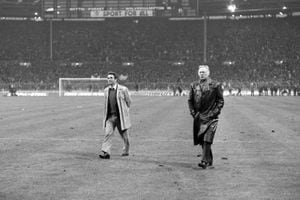
“He knew his team had probably played better than us and had done everything that it could without being able to score on the day.
“He could probably afford to be generous as Forest were so good at that time in winning the trophies that they did!”
Clough’s generosity in defeat also extended to answering a knock of the dressing room door from Palmer and Bradshaw who went in to swap shirts with Robertson and Shilton respectively.
“That was very good of him to be honest as there was a deathly silence in there – I remember thinking this is what it must be like to lose a final,” says Palmer.
The atmosphere was slightly more raucous when Palmer and Bradshaw popped for a cheeky pint in the Dog & Gun in Tettenhall enroute to the reception at The Mount after the coach had returned to Molineux.
“I don’t think the fans could believe that we were there and we certainly wouldn’t have had to buy a drink had we stopped all night,” Palmer laughs.
For he and Richards, experiences of 1974 and 1980 were very different, both in terms of how the games played out, and the different stages of their careers.
“I remember before 1980 chatting to Willie Carr who was playing at Wembley for the first time and said he just wanted to make sure he enjoyed every single part of it,” says Palmer.
“For me, I think I enjoyed that one more just because I knew what to expect with the build-up and everything, and was probably more relaxed.
“Back in ’74 I was only 19 and it was all new but I was more established and, as a team, we had all been around a little bit as well.”
Richards, like any self-respecting striker, admits it wasn’t quite the same as the previous final, because he didn’t manage to get on the scoresheet!
He was involved in an aerial collision with Shilton where the ball crossed the line but the goal was controversially ruled out, although isn’t completely sure that he got a touch.
“It does make a difference if you don’t score, both personally and professionally,” Richards explains.
“Chances to score at Wembley are few and far between in a career – I only played there twice – and so I wanted to score.
“Getting the winner against Manchester City proved to be the highlight of my career, simple as that.
“So, 1980 wasn’t the same and wasn’t the pinnacle, but obviously even though I was disappointed not to score, the first consideration was winning the game.
“And it was a real team effort in what was a fairly dour game.
“Forest had some great players and they did well, but our defence was outstanding with ‘Brad’ (Bradshaw) superb as were Emlyn and George (Berry).”
It was a very different experience for Eves.
In 1974 he had been on the terraces as a 17-year-old fan and schoolboy, still not even sure he was going to get a Wolves contract.
Now, he was picking up a League Cup winners’ medal.
“If somebody had said, when I was at that City game, that six years later I would be playing for Wolves at Wembley and winning the League Cup I really wouldn’t have believed it,” he says.
“Not to mention that, but playing alongside some of my heroes I had watched growing up, it was a real pinch yourself moment.
“I didn’t achieve what the likes of Emlyn and others achieved in the game but I know what that day meant to me and particularly to the Wolves fans.
“I have spoken to multi-millionaires since who have said they would give up all that to play a game for Wolves, let alone a cup final at Wembley.
“It’s what you dream of as a kid, isn’t it? And I just feel extremely blessed that I was able to experience it.”
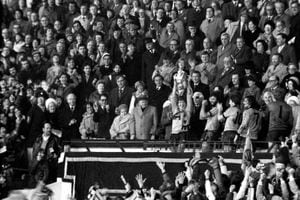
Talking of Hughes’ achievements in the game, that was of course the additional narrative around the cup success which lit up his two years at Molineux.
At Liverpool he had won the League title, FA Cup, Charity Shield, European Cup, UEFA Cup, Charity Shield and UEFA Super Cup.
No League Cup, but that was put right in gold and black.
“He was a lucky sod, wasn’t he?” laughs Palmer.
“One of the big things I remember from the day is the Wolves fans singing ‘You’ll never Walk Alone,” adds Richards.
“That was for Emlyn, which I thought was a lovely touch, and he played out of his skin that day.”
He did indeed, and while daughter Emma was a bit too young to remember the game – she was only six when Hughes first moved to Wolves – she knows how much it meant to her father, who sadly passed away at the age of 57 in 2004, as a result of a brain tumour.
“I know my Dad cherished his Wolves’ League Cup win with so much pride,” Emma reveals.
“He always said to me his ‘trademark’ smile walking up the Wembley steps to pick up the cup was particularly wide and heartfelt, despite being ‘absolutely knackered’.
“He said he was getting to the stage of his career when in his head he knew what the opposition player was going to do – but his legs couldn’t keep up!
“Dad loved his time at Wolves and always felt his relationship with the fans was a special one and this was always evident whenever we returned to Molineux as a family.
“And to me, his time at Wolves represented the first real memories I had of him as a footballer as despite going to Anfield every game since I was six weeks old, much of that time was spent with other children in the players’ lounge.
“We were still living in Formby when Dad was at Wolves so every home game we would go and stay in the Mount Hotel the night before the game, and that brings many more memories.”
Those Wolves-related memories include the discovery that Father Christmas wasn’t actually real as Emma spotted her Dad bringing in her brother Emlyn junior’s table football set from the car on Christmas Eve.
She also remembers the Mount serving the very best ham omelette, hiding behind Mum Barbara’s skirt every time Gray walked into the players’ lounge, not to mention Wolves’ 1-0 win against Liverpool at Molineux after which Eamonn Andrews emerged onto the pitch to present Hughes with the famous ‘This is Your Life’ red book.
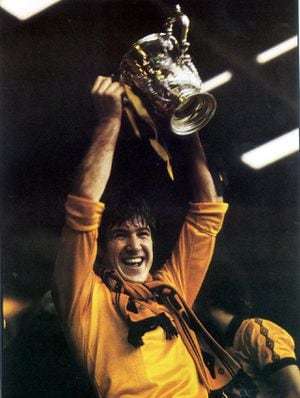
The Mount also played a big part on that final-winning day, hosting the celebratory reception ahead of an open top bus parade through Wolverhampton the following day, after which several of the squad headed to London for the PFA Awards.
It was to prove perhaps the beginning of the end for such a successful squad, with relegation a couple of years later and off-field financial issues sparking a dramatic decline in Wolves’ fortunes, with the exception of the promotion season during the tenure of Graham Hawkins.
By the time they returned to Wembley eight years later, for the Sherpa Van Trophy final, the club were just coming back up from the Fourth Division and the revival was underway.
That’s a reminder that there have been plenty of lower league championships to savour since 1980, and three FA Cup semi-finals, but still not what would be termed a major top-flight trophy.
Forest too will feel they are due another success, and so, for the two teams who have met twice in the League Cup since lining up on opposite sides at Wembley, with one win apiece, the stakes are high.
“The pre-requisite is for Wolves to stay in the Premier League and I understand that with all the financial implications which are very different to when we were playing,” says Eves.
“But fans remember going to cup finals and winning things and this is a real chance to try and do that.”
1980 feels like it occupies the very distant past now. And there remains much work to do. But maybe, just maybe, this is the time.
“Our family have such wonderful memories of those Wolves years,” concludes Emma.
“I hope we can all be at Wembley on February 26th to support Wolves to another cup win!”

